
22 minute read
Discover your ‘language of love’ for a better relationship 24, 25 Healthy hearts and minds go together
You say ‘neether’ and I say ‘nyther’… Let’s call the whole thing off!
The Gershwin brothers knew a thing or two about how people think and express themselves differently, have individual desires, motivations and inspirations. So it’s good to tailor communications for the person we’re dealing with, especially if broaching a tricky topic. Article by Dr Ben Ebert.
STRENGTHENING YOUR RELATIONSHIP
HOW WE LOVE EACH OTHER –THE FIVE LOVE LANGUAGES
In his bestseller, The Five Love Languages, Dr Gary Chapman identifies that people express their love and feel loved in five main ways and respond differently to certain modes of communicating love. It’s likely that we communicate in different love languages than our partners. People can experience love through all five methods but usually one or two hold more significance for each person. Understanding and decoding the five love languages and identifying which most apply to you and your partner will help take the guesswork out of your expectations and needs. According to Dr Chapman, the five love languages are words of affirmation, acts of service, receiving gifts, quality time and physical touch. 1) Words of affirmation and validation: Shortest, simple praise can be most effective: ‘you always make me laugh’, ‘I love your hair today’ or ‘this meal is delicious’. 2) Acts of service: Actions speak louder than words. You feel loved or express love through thoughtful or helpful efforts – cooking a meal, doing the laundry or filling their car with petrol. 3) Gifts: It doesn’t have to be a diamond ring. Gifts make you feel thought of, appreciated and loved, for example coming home with their favourite treat or flowers.
4) Quality time: Undivided attention. No television, phones or other distractions. If this is your love language, you feel valued when you’re the centre of your partner’s attention. Going for a walk together or going out to dinner enables you focus only on each other. 5) Physical affection: Physical touch provides feelings of connection and safety. Holding hands, kissing, hugging and intimacy are of utmost importance for people who experience love and validation through physical closeness. Try this exercise with your partner: Identify and discuss your two main love languages and guess their top two love languages. Tell each other why they are your main love languages and what makes you feel loved. Consciously practise your partner’s primary two love languages. Making an effort in the areas that matter most to your partner can be a simple but highly effective way to strengthen a loving relationship.
KEEPING YOUR RELATIONSHIP HEALTHY
Understanding your partner's distinct emotional needs, communicating feelings clearly and openly, and maintaining intimacy are key factors in developing a strong and healthy relationship. Listening, asking questions, and acknowledging and validating your partner in the ways that they respond to best will resolve many struggles that arise from, and are exacerbated by, miscommunication.
Ben Ebert is a psychologist based in Lane Cove who specialises in depression and anxiety and works with individuals experiencing relationship difficulties and workplace issues. See: https://northsydneypsychologists.com.au
Look at building your self-esteem, self-validation and self-growth. In order to forge a healthy and respectful relationship with another person, it’s important to be comfortable with and respectful of yourself first. To do this, focusing on your strengths, both personal and work/ study related, and identify areas in which your self-worth could improve. ● Identify your needs in a relationship including emotional, physical, intellectual and spiritual. ● Prioritise developing and maintaining intimacy. Intimacy is not just about sex; it is a feeling of emotional connection and closeness and doesn’t not always come naturally. It is something you need to constantly work at by communicating your needs and how you are feeling. Trusting your partner with your feelings often leads them to open up to you too.
Always waiting for the other person to open up first can create a barrier to intimacy. ● Build connection through ‘the three blessings’: At the end of each day, tell your partner three positive things from your day – for example you helped a colleague at work with a problem or had a funny conversation. This will encourage sharing and give insight to your individual motivations.
Our nation’s dental health
A report by the Australian Health Policy Collaboration found last year that only half of all Australians brush their teeth twice a day – but what are the results? Advertorial by Mark Casiglia of Apple Dental.
Not brushing twice daily has definitely contributed to a finding that 90% of Australians have some form of tooth decay. The report linked smoking and drinking to poor oral health, and found that almost three quarters of all Australian children eat too much sugar, leading to more than one third of five-year-olds having decay in their baby teeth.
What can we make of these findings?
Certainly, good oral care habits are important to help us counteract the lifestyle disease we call tooth decay. But the ultimate prevention can only be achieved by addressing our diet. Before humans began farming and processing food around 10,000 years ago, tooth decay was extremely uncommon. Farming saw the increase in consumption of simple carbohydrates and processed food such as flour. This fed the oral bacteria their preferred diet and actually helped decay-causing bacteria to proliferate so that our oral micro-flora changed after farming. It is only recently that sugar - the most dentally destructive dietary component - has come into common use. Although refining sugar was first documented 8,000 years ago, it has only regularly appeared in the diet in the last 200 years, with consumption greatly increasing in the last 100 years or so since food manufacturers started adding it to their products.
These days, around 80% of processed food products contain sugar, irrespective of whether the food is sweet or savoury! This makes it difficult to navigate our food choices to reduce sugar exposure.
What could turn the sugar avalanche around?
Many people point to the difficulty in getting professional dental care as the biggest obstacle in combatting dental diseases. Yet prevention is a far better solution than treatment.
Dentistry is extremely expensive for government to fund due to the high overheads. Governments should focus on community education as well as strategic measures to reduce the consumption of processed foods containing sugar. One example would be through taxing sugar. The money raised could then be diverted back into community health education initiatives, as well as the provision of medical treatments for all the various metabolic diseases also caused by sugar consumption, such as diabetes and cardiovascular disease.

1 Finlayson St, Lane Cove. Phone: 9420 5050 www.appledental.com.au
Meet your FREE digital coach for anxiety & depression
Created by Flinders University S.A. the Clevertar program will guide you through a tailored program to help you make changes to improve how you feel.
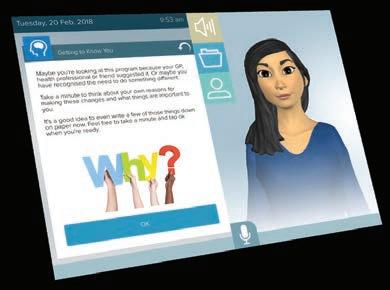


How to get started
1. Use your smartphone or tablet to download the app by searching for
‘Clevertar’ in the App store or Google Play 2. Open the app and tap
‘Create Account’ 3. Enter the invitation code:
4. Complete the registration details & get started with your coach
BalancedMind
Be part of shaping a healthier local community Be part of shaping a Be part of shaping a healthier local community healthier local community
Be part of shaping a healthier local community
PEOPLEBANK...
is a community of Northern Sydney residents interested in PEOPLEBANK... staying up to date with health issues and sharing their opinions experiences on the health services in the region. is a community of Northern Sydney residents interested in staying up to date with health issues and sharing their opinions experiences on the health services in the region.
PEOPLEBANK...
is a community of Northern Sydney residents interested in staying up to date with health issues and sharing their opinions experiences on the health services in the region.
MIND over Mediterranean
A 12-year study of dietary patterns in older adults in Australia showed those who followed a diet designed for brain health had a reduced risk of cognitive problems including Alzheimer’s and dementia.
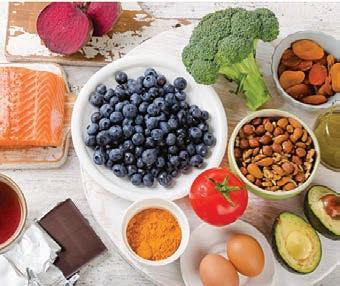
Led by researchers from Neuroscience Research Australia (NeuRA), UNSW Sydney and ANU, the study reviewed the potential protective effects of the Mediterranean-DASH Intervention for Neurodegenerative Delay diet, aka the ‘MIND’ diet. DASH stands for Dietary Approaches to Stop Hypertension. The MIND diet includes elements of a typical Mediterranean diet but also neuroprotective foods that protect brain health. The focus is on green leafy vegetables, whole grains, olive oil plus small amounts of red meat. The comprehensive study followed 1,220 adults aged 60-plus for 12 years. During this time, following the MIND diet was linked to 19% reduced odds of developing clinically diagnosed, mild cognitive impairment or dementia. In contrast, no cognitive benefit was found for adhering to the Mediterranean diet. Scientia Professor Karin Anstey, Director of the UNSW Ageing Futures Institute who led the study, believes the results will contribute to more specific recommendations for reducing the risk of dementia.
Participants were initially interviewed about their diets using the CSIRO food frequency questionnaire. Then their cognitive abilities or impairment were assessed over time and diets were scored as to following the MIND or Mediterranean pattern. Professor Martha Morris developed the MIND diet in the US. What sets it apart from other diets is that it specifies foods thought to be neuroprotective, such as green leafy vegetables and berries. The authors say the next steps are to evaluate the diet in randomised controlled trials to reveal the protective mechanisms and pathways associated with the MIND diet.
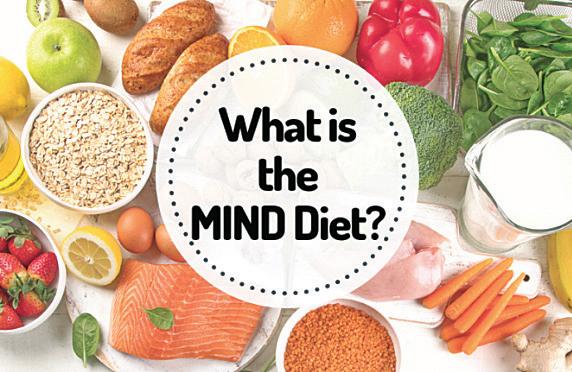
SEE MORE ON THE STUDY AND THE DIET AT https://www.memorylosstest.com/ mind-diet-guidelines/
21-29 September 2019 Fitness and fun for the family!
Lane Cove’s Bike Week Breakfast
Wednesday 25 September, 6:30am – 9:00am In the car park adjacent to 71 Longueville Road, Lane Cove
Come along and enjoy a free healthy breakfast and coffee, meet fellow cyclists, browse through cycling information and take home some giveaways. A bike mechanic will be on site to give your bike a free check and tune up.
HEALTHY HEART AT 50 LINKED TO LOWER DEMENTIA RISK

It’s confirmed! Good cardiovascular health at age 50 is strongly associated with a lower risk of dementia later: these are the results of a remarkably comprehensive study of almost 8,000 British adults over 25 years. Dementia starts to develop 15-20 years ahead of symptoms so warding off its onset is vital – and not impossible – because cardiovascular risk factors are modifiable. It is now certain that, for most people, lowering cardio risk will have a dual benefit – for heart and brain health. The American Heart Association’s ‘Life’s Simple 7’ score for cardiovascular health has been put forward as a potential tool for preventing dementia as well as cardiovascular disease.To address uncertainty around that suggestion, research led by French National Institute of Health and Medical Research and University College London, examined the link between the Life’s Simple 7 cardiovascular health score at age 50 and risk of dementia over the next 25 years. Published by The British Medical Journal in early August, the study of cardiovascular data from ‘Whitehall II’ group of 7,899 civil servants of both sexes at age 50, also included data on social, behavioural, and biological factors for long-term health. The subjects were all free of cardiovascular disease and dementia at 50 and later dementia cases were identified using hospital, mental health services, and death registers until 2017. Researchers found that following the Life’s Simple 7 cardiovascular health recommendations in midlife was linked with a lower dementia risk. Compared with an incidence rate of dementia of 3.2 per 1000 person years among the group with a poor cardiovascular score, those with an intermediate score had an rate of 1.8 per 1000 years, while those with an optimal score only had incidence of 1.3 per 1000 years. Higher cardiovascular health score at age 50 was also associated with higher whole brain and grey matter volumes in MRI scans 20 years later. And reductions in dementia risk were also evident across the continuum of the cardiovascular score, suggesting that even small improvements in cardiovascular risk factors at age 50 may reduce dementia risk in old age, say the researchers. “Cardiovascular risk factors are modifiable, making them strategically important prevention targets. This study supports public health policies to improve cardiovascular health as early as age 50 to promote cognitive health, too” the researchers reported, while also noting that cardiovascular health at 50 can also be determined by factors earlier in life, including inequality and social and economic determinants. • Check up on your heart health at the
American Heart Association site https://bit.ly/2BekZIW • See the article in the British Medical
Journal at https://bit.ly/2YTnugG • Seniors, why not join one – or more – of Sydney Community Services’ healthy activities – shuffleboard, table tennis, ballroom dancing lessons, and
Mindfulness or Movement Matters sessions? See what you can get involved in at our Facebook events page at https://bit.ly/2YURPr9
YOUR LOCAL EYE SPECIALISTS lane cove eye surgeryYOUR LOCAL EYE SPECIALISTS SUITE 304, 71 LONGUEVILLE ROAD, LANE COVE

SUITE 304, 71 LONGUEVILLE ROAD LANE COVE 8377 7600 8377 7600 WWW.LANECOVEEYE.COM.AU
BURNS BAY PHYSIOTHERAPY Shoulder pain
Our shoulders are very flexible joints and their dexterity allows us to use our arms effectively for activities such as reaching, carrying, writing, dressing, general activities and most sports. When we have pain or stiffness in our shoulders it can be problematic. Understanding why a shoulder is stiff or painful is the key to returning your shoulder to good function. The pain can be from the shoulder, neck, upper back regions, muscle weakness or muscle tightness. Sometimes problems with biomechanics in the hips or legs can be related to shoulder dysfunction. People often get concerned that they may have a tear in their rotator cuff and may need it surgically repaired. Rotator cuff tears are so normal most people have them without knowing as they do not cause problems. If they do cause problems physiotherapy should be the first course of action as research tells us the outcomes are the same for both options at 1-year post injury and physiotherapy is also cheaper without the possible side-effects of surgery. At Burns Bay Physiotherapy we assess the factors contributing to your problem and then devise a plan of how to help you. This usually involves a combination of hands on treatment and exercises.
Ann Jill Kirsty Andrew
BURNS BAY PHYSIOTHERAPY 161 Burns Bay Rd, Lane Cove 9427 8333 E: info@burnsbayphysiotherapy.com.au www.burnsbayphysiotherapy.com.au
Nothing to be sniffed at: spring allergy remedies
As the air warms and jasmine blooms, seasonal allergies can hit. There’s more than one way to stop your body mistaking harmless pollen for a nasty intruder. Advertorial by Phil Wade of Wade’s Wellness Chemist.
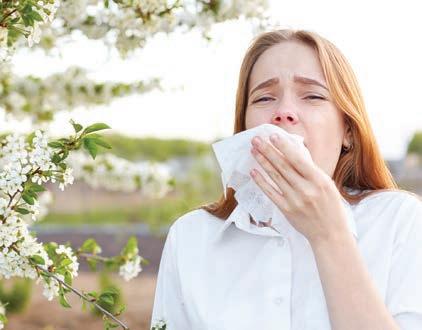
Spring allergies
Early morning sneezes? Reaching for tissues? Spring allergies are an unpleasant affliction during what should be our most enjoyable season.
How does it happen?
• Spring allergy is essentially recognised as a ‘mistake’ by your immune system because it thinks air-borne pollens you inhale are ‘attacking’ you. • It can start with food allergies, or ‘leaky gut’, which prime your reactive mast cells to be on constant alert. • This constant state of alert releases histamine and prostaglandins from mast cells, as they explode to deliver antibodies to attack the ‘invader’ (in reality, harmless pollen). • This can result in swelling of the skin, nose, throat and airway membranes which may cause itching, sneezing and/ or wheezing. That’s spring allergy.
You can manage spring allergies with…
• Pharmaceutical antihistamines: see (https://internationalwellnesscentre. info/) for further advice and winter/spring discounts. • Herbal antihistamines, such as Albizzia and a Scutellaria variety are traditionally used to reduce hay fever symptoms (ask our pharmacist/ naturopath). • Several homeopathic remedies may also relieve itching, sneezing and inflammation, such as Rhuss tox and others. • Nutritional antihistamines, such as a regular mixed vitamin C and bioflavonoids which are truly nature’s antihistamines. We are lucky we can make this to order in our compounding lab with a pleasant-tasting, fizzy action. • Leaky gut: Correcting serious depletion of microbiota in your normal gut lining, as well as microbiota in your ear, nose, throat and lungs, can prevent havoc with the layer of immune cells. The ‘leaky gut’ test is not to be sneezed at, as the condition actually exacerbates the tendency for inflammation if you develop an overgrowth of parasites and toxic bacteria, as well as candida. Finally, if after treatment you are worried your immune system will still make ‘mistakes’, chat to us about a great NLP technique that has been developed for this purpose.
ABOUT REBATES
Federal Health Minister Greg Hunt has included nutritionists on the list of those eligible for health fund rebates, while removing naturopaths. All naturopath and nutritionist consultations are rebated by us on refusal of health insurance funds.
Wade's Wellness Chemist
A free consultation with Phil Wade precedes commencement of the following treatments because balance is imperative in all things nutritional.
“Wade’s pharmacy and clinic presents a seamless offering of care from urgent medical prescriptions to support for those “grey areas” of health that Health Scientist Dr Jeff Bland refers to as the “walking wounded”. PRESCRIPTIONS AND OTC MEDICINES. We guarantee that you can always talk directly to a pharmacist. Your health matters to us. We also compete with all locally advertised prices. TALK TO THE NUTRITIONIST. Preparing meals on the run? Kirsty, our clinical nutritionist, will have a healthy solution for you. TALK TO PHIL. Feeling a bit under the weather but not sure why? Phil may have a solution for you, even if you’ve “been everywhere else” looking for an answer. UNDERYLING CAUSES. One often overlooked root cause of lingering illness is undernutrition. World studies show that food mineral and vitamin content has declined by 90% in the last century, having accelerated in the last thirty years. Ask us to make you a blend to suit your needs. Our novel approach can tailor a blend that is ideal for you and save you $$$s and time in random purchases.
Wade's — We don’t just deal in sickness, we deal in health too! Visit us and be guaranteed to talk to a pharmacist, nutritionist or naturopath/herbalist.
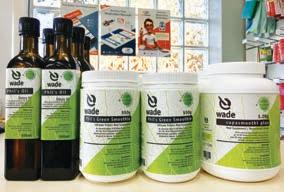
POPULAR GENERAL CHOICES FOR HEALTH BUILDING ARE:
• Phil’s Oil (your body needs specific fats for energy production); • Wade’s Winter Mix that may keep immune cells healthy;* • ZinAc formula to help growth and recovery; • Wade’s MVM 12:78 powder – or a mixture of the above in one container! • Phil’s Green Smoothi overall meal supplement for busy people; • Phils Supasmoothi meal replacement to help reach your ideal weight.
WADE’S WELLNESS CHEMIST AND CLINIC
Learn FAST, save a life
Australians of all ages can learn the common signs of stroke – FAST – and remember to ask just four questions (below). It’s vital to learn these and phone an ambulance quickly if you suspect a stroke because: • Stroke can strike anyone at any age - even babies can have strokes. • There is one stroke every nine minutes in Australia. • More than 475,000
Australians are living with the effects of stroke. You can save the life of a loved one, a colleague, a stranger or even yourself by understanding the F.A.S.T message and calling an ambulance immediately if you suspect a stroke.
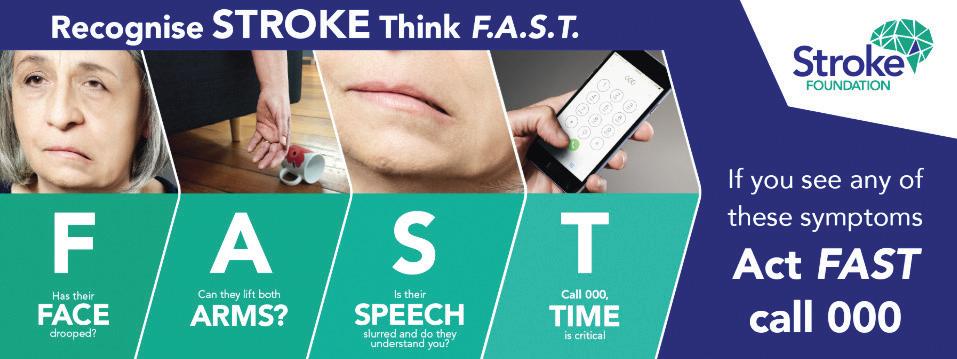
Face Check their face. Has their mouth drooped? Arms Can they lift both arms? Speech Is their speech slurred? Do they understand you? Time Is critical! If you see any of these signs call triple zero (000) straight away. Stroke is a sudden interruption of blood flow to the brain and effects can be less devastating if treatment is immediate. “Brain cells can quickly die without the oxygen that the blood supplies. And more brain cells can survive if a person is treated quickly,” says Sharon McGowan, CEO of the Stroke Foundation.
Risk factors for stroke include
• Lack of exercise • High blood pressure • High cholesterol • Obesity or being overweight • Smoking • Poor diet • Alcohol
LEARN MORE AT https://strokefoundation.org.au/ PHONE 1800 787 563 FOR INFORMATION ON STROKE TREATMENT, PREVENTION AND RECOVERY.
Dance Health Alliance launches in Lane Cove!
Empowering people to find their freedom through movement! The Dance Health Alliance™ is a Not For Profit organization, facilitating innovative dance programmes designed to improve quality of life, help restore body/ mind balance and combat ill health. The one hour DanceWell community based lessons are devised for people living with MS, Arthritis, Parkinson’s, Dementia, Alzheimer’s and conditions causing restricted movement, but are also inclusive to anyone who just want to dance.
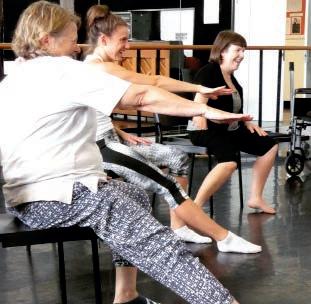
Dance Health Alliance DanceWell Class Meeting Room on Level 2, 102-104 Longueville Road, Lane Cove Entry via Longueville Rd Next to “Glowing Flowers” or Pottery Lane via the doorway located next to “Learning Minds” 3 hour free parking available at Little St Car-park
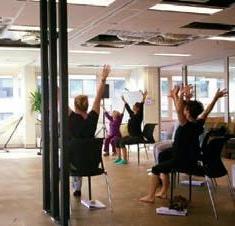
Contact info@dancehealthalliance.org.au or visit www.dancehealthalliance.org.au For more information on classes, teacher training opportunities and more!
No dance experience necessary. All ages and levels of mobility. Strengthen your mind and body while having fun. Your first class is free! So, what are you waiting for? Let’s Dance!
Rising to longevity
Sitting is the new smoking. Will they plaster office chairs with pictures of people dying from lack of movement? That won’t be necessary if you have a standing desk which raises much more than your computer. Review by Christine Powis.
Too much sitting time – commonly TV, computer or travel time – is a killer. The ‘sitting disease’ generally risks slow metabolism, back or neck pain, low energy and productivity, poor heart health and attendant problems … even bad memory and depression. The specific risks are more scarey ... The American Journal of Epidemiology (AJE) confirmed in 2018 that more than 6 hours vs. less than 3 hours sitting per day was linked to higher risk of mortality from ‘all causes’ – including cardiovascular disease, and strokes, cancer, diabetes, kidney disease, suicide, chronic obstructive pulmonary disease, pneumonitis, liver, digestive diseases eg ulcers, Parkinson’s, Alzheimer’s, nervous and musculoskeletal disorders. Even memory is boosted by standing or walking. Standup desks can radically reduce sitting time and offer health benefits mitigating these risks. Desks range from simple, manual wind-ups where the entire desk moves up, to ones which memorise electronic settings to your favourite height positions, and Varidesk offers the gamut. The manual desktop model I’m using ProPlus 36 is surprisingly easy to adjust. This two-tier desk sits atop your existing desk, raised or lowered with just a few fingers on levers on either side. The movement is so smooth it can be done with a little pressure and without spilling a coffee sitting on one of the levels. Many models of Varidesk come with a spring-assisted lift which enables the smooth movement. Also wonderfully easy is the fact that most models are ready to use straight out of the box – I did not read a manual.
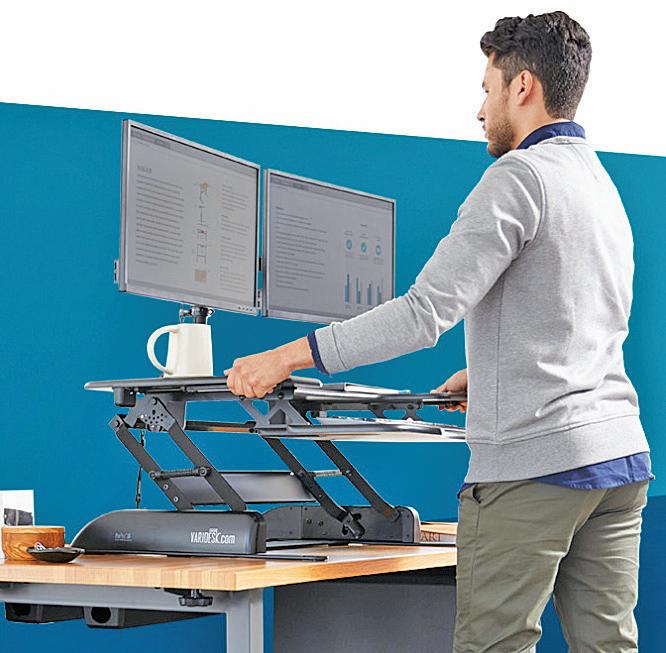
Business Bookkeeping You Can Count On
█ Weekly monthly or quarterly accounts Weekly monthly or quarterly accounts management. management. █ Payroll, PAYG & Superannuation, including Payroll, PAYG & Superannuation, including Single Touch Payroll reporting Single Touch Payroll reporting █ Bank reconciliations. Bank reconciliations. █ GST & BAS Services* GST & BAS Services*. █ Accounts Payable/Receivable. Accounts Payable/Receivable. █ Cash flow management. Cash flow management. Call Alice Little on 0430 375 988 at First Class Call Alice Little on 0430 375 988 at First Class Accounts Lane Cove to arrange a free business consultation Accounts Lane Cove to arrange a free business consultation www.firstclassaccounts.com/lane-cove www.firstclassaccounts.com/lane-cove E: alice.little@firstclassaccounts.comE: alice.little@firstclassaccounts.com
Varidesk models offer different sizes and weight capacities. Compact versions are designed for laptops and are easily moved to another table; some support multiple screens, others can be arranged for corners or L-shaped desks. There is a range of accessories, too, right down to the roller ball to work with your foot while you’re doing other work! LiveScience says a Mayo Clinic analysis of nearly 50 previous studies on calories burned while sitting versus standing showed the average 65kg person who stood instead of sitting six hours a day would burn an extra 54 calories per day. Not enough to lose weight, said Mayo, but enough to stop putting additional weight on. The AJE found health problems from sitting were so significant that the topic should be studied separately from too little exercise. The Heart Foundation agrees: even if you meet guidelines for physical exercise, it may not reduce the risks of sitting too much. Health benefits are greatest for people who sit less, AND move more. So you can’t completely excuse a lot of sedentary time by saying you ‘balance’ it by exercising regularly. And – warning – don’t cut out regular exercise if you stand for much of the day. Varidesk promotes an active office: “splitting time 50:50 sitting to standing, will boost your physical, and mental health and memory – for a more productive, happier work day”. It definitely helped me focus on good, ergonomic posture. And I must say I felt more energetic at the end of the day after I had stood most of the day at the Varidesk, so was far more likely to include other exercise at the end of the day. Strange but true and healthy – and that makes me happy.
The reviewer was given a Varidesk by the UK manufacturer. See AU.Varidesk.com • See American Journal of Epidemiology, 2018 https://academic.oup.com/aje/ article/187/10/2151/5045572 • Heart Foundation https://www.heartfoundation. org.au/active-living/sit-less • https://www.livescience.com/ and 5 Tips for
Sitting Less During Your Workday






